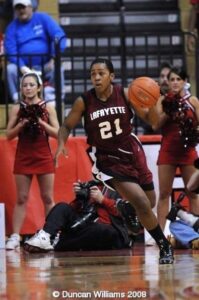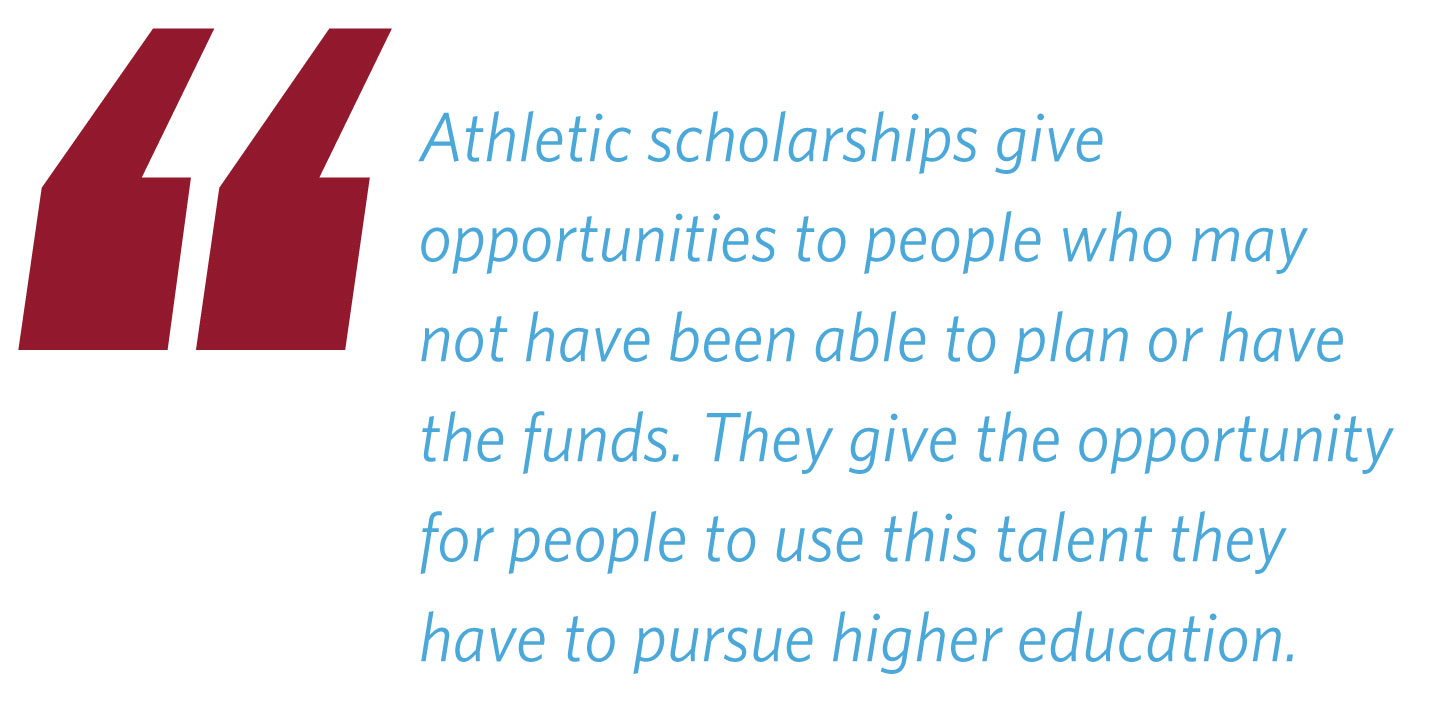Power Play

By Heather Mayer Irvine
To say playing basketball helped mold LaKeisha Wright ’11 into the woman she is today would be an understatement.
Lafayette recruited Wright to play college ball and offered her a partial athletic scholarship, which, Wright says, was a deciding factor in heading to Easton.
“I fell in love with the campus,” she says. “It’s beautiful, right?”
During a basketball meet-up, Wright clicked immediately with her future teammates, sealing the deal.
“I was laughing from the beginning,” she says.
A Game-Changing Opportunity
Wright was born and bred in Upper Marlboro, MD., and has played basketball since she was 4 years old. Maryland ball, she says, set the bar pretty high in terms of competitiveness. She had two athletic scholarship offers but committed to Lafayette and has never looked back.
“The bigger schools wanted me to decide my junior year [of high school], but family things delayed that decision,” she says. “Everything happens for a reason, and I was meant to be at Lafayette.”
“Athletic scholarships give opportunities to people who may not have been able to plan [for college] or have the funds,” Wright says. “They give the opportunity for people to use this talent they have to pursue higher education.”
Wright, who served as a guard and forward on the Lafayette basketball team, took advantage of everything the college had to offer—athletics and academics.
“[Athletic scholarships] can give you an experience you wouldn’t get in your hometown. They expose you to different cultures and experiences that will give you a well-rounded skill set,” she says.
Attending Lafayette and playing basketball on a predominantly white team opened Wright’s eyes to people she wouldn’t have otherwise interacted with, she says, and that gave her more understanding and perspective as she entered the workforce.
“It was great to get experience out of my norm,” she says. “For me, personally, there wasn’t anything I disliked [at Lafayette] as an African American student. I wish campus were more diverse, but I know Lafayette is working toward that.”
Finding Balance
Wright excelled on and off the court, but not at first. Trying to balance the rigors of college ball and top-tier education was a shock to the first-year student-athlete.

The biggest “Whoa” moment for Wright was the structure at Lafayette compared to what she’d been used to in high school. Never a morning person, Wright now had to wake up for a 5 a.m. workout before a full day of classes. And when it came to academics, Wright had to transition from memorizing information, which was the way of things in high school, to thinking on her own in Lafayette classrooms.
“You have to come up with your own reasoning rather than regurgitation,” she says. “And when you’re in the workforce, you have to think for yourself. That was a wow factor for me.”
The professors, Wright says, held all of their students—athletes or not—accountable for work they had to do in class.
“Without Lafayette, I wouldn’t have realized that there’s more to life than just basketball.”
Wright had planned to study computer science, but she ultimately graduated with a degree in anthropology and sociology, which, she says, laughing, helped her understand people as she made her way into the professional world.

A Pro Basketball Player
Only a small percentage of college athletes go on to play their sport at the professional level. Wright happened to be one of them.
After graduation, Wright headed to Leeds, England, to play professional ball. She and her teammates—a mix of English and international players—played for the professional team and a university team, where she received a master’s degree in business administration with a concentration in organization and leadership.
If she hadn’t accepted the Lafayette scholarship, she never would have played in England, Wright says.
“Ultimately, if it wasn’t for Vanessa [VanDeVenter] Hunter [’08], I wouldn’t have gone,” she says.
Hunter was an older teammate who had played in England after graduating and told Wright about the opportunity.
“She kept telling me, ‘You have to do this. It’s an amazing experience,’” Wright recalls. “I remembered it when it came time to graduate. I reached out to the coach, and they were very interested.”
The program abroad paid for Wright’s master’s degree, and once she graduated, she was received a stipend for playing on the professional team.
Lafayette, Wright says, set her up for success in the classroom and on the court in England.
“The UK educational system is excellent. It’s amazing, maybe higher than ours in America,” she says. “The adjustment was hard in the beginning. Lafayette teaches you and encourages you to think outside the box, and the UK does that even more.”
Lifelong Lessons
Wright played ball overseas for 2.5 years before heading home and landing a job with Homeland Security in Washington, D.C.
“I’m not going to lie, I didn’t know what I wanted to do with my career,” Wright says. “I had focused a lot on basketball.”
Ultimately, Wright’s MBA helped guide her toward contract-writing. Today, she writes contracts for the IT department of Homeland Security. The irony—finding a job in IT after not studying computer science like she’d planned—is not lost on Wright.
But it was playing on a team and her undergraduate work at Lafayette that has helped Wright work with all types of people.
“My sociology and anthropology work really helped me deal with people in the workforce,” she says. “It gives me an understanding of people, why people do certain things.”
Basketball, she says, taught her the importance of teamwork.
Wright reflects back to times on the court with her Lafayette teammates and how they didn’t always agree on every game-play decision.
“Even if I didn’t agree, I listened to them and their point of view,” she says. “It’s not always about you, and sometimes you have to sacrifice selfish desires to attain a common goal.”